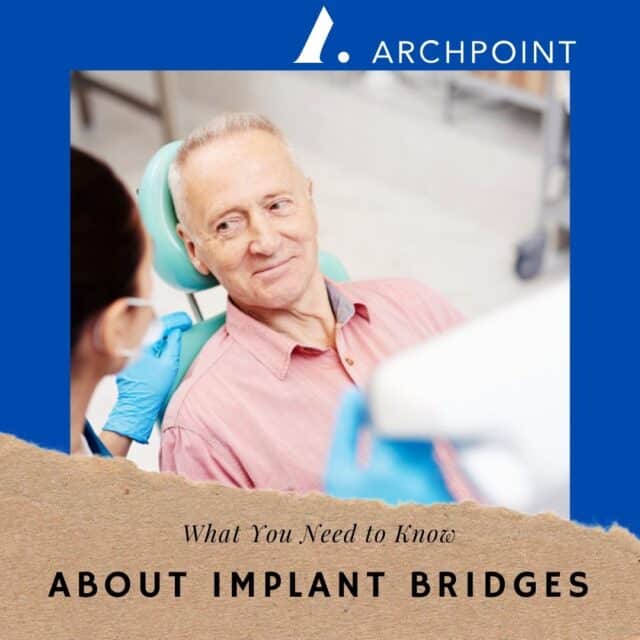Dental implant bridges have some similarities with traditional bridges, but with a lot of added perks. If you’re lost deciding between a traditional bridge, dental implant bridge, or All-on-4 treatment, here’s what you need to know about implant bridges and what makes them different from other options.
The Difference Between Fixed or Implant Bridges
Most people are fairly familiar with traditional dental bridges. AKA “fixed bridges.” These restorations are attached to natural teeth and suspend an artificial (pontic) tooth between them, filling in an open space. A sound tooth on either side is required.
But fixed bridges also have a couple of disadvantages. For one, if one of the supporting teeth begins to fail due to gum disease or decay, it jeopardizes the integrity of the entire restoration. Secondly, they’re quite invasive to the teeth supporting them. The healthy tooth has to be cut down so to speak, for the bridge to fit on top of it. If those teeth don’t need crowns, it’s not a very conservative treatment option.
With an implant bridge, we place the porcelain bridge directly on top of a pair of dental implants for support. No anatomical teeth are involved. Usually, 3-4 teeth at a time are being replaced, whereas a traditional bridge will only replace 1-2 teeth, maximum.
Advantages of a Dental implant Bridges
Incorporating dental implants with an attached bridge adds stability. In turn, you don’t have to wear a removable appliance. So, if you thought that a partial denture was your only option, think again! The integrity of a dental implant bridge means that you can keep eating all of your favorite foods without having to significantly alter your lifestyle.
You can replace more teeth at a time with dental implant bridges. You don’t need a one-to-one ratio of an implant per tooth missing. Since implants are so strong, we can use fewer of them to permanently anchor your dental restoration.
When you choose to go with dental implants, you’re preserving the integrity of your natural, healthy teeth. There’s no cutting into intact enamel to install a bridge. Those intact teeth are left alone. Implants are the non-invasive alternative that’s beneficial to the teeth around them.
Dental implant bridges last for years. Whereas traditional dental bridges (over natural teeth) have to be routinely updated over time. Since the supporting implant underneath your bridge isn’t going to erode or decay like tooth structure may, you know it has the potential to last a lifetime. As long as you care for the bridge on top of it, your investment can outlast other types of tooth replacements.
How Many Teeth Can You Replace?
With a dental implant bridge, you can replace several teeth at a time. A traditional bridge (placed on top of natural teeth) can only restore one or two missing teeth, but an implant version could replace 3-4 or more, depending on how many implants you wind up using. Since the implants are stronger than a tooth would be, we know that they can support a more intense amount of biting pressure. This is why it’s completely safe to pair them together for multi-tooth restorations like bridges.
Typically, we use a pair of dental implants to support a three or four-tooth bridge. If there are more teeth involved, we can incorporate additional dental implants to widen the length of the bridge. This option prevents our patient from having to wear a removable partial denture. A traditional bridge isn’t capable of replacing three or more teeth at a time.
If you think that your only option for replacing missing teeth is a partial denture, a dental implant bridge is a perfect solution! But the key is to work with experienced implant experts who understand the complexity of the situation and have the skill to ensure a successful outcome. ARCHPOINT implant dentists specialize in a wide variety of implant therapy. If it’s a possibility, we can make it a reality.
“Is an Implant Bridge or All-on-4 Better?”
Hypothetically speaking, is it better to get a longer dental bridge, multiple implant bridges, or to go with a full-arch “All-on-4” type of treatment?
It all depends on how many teeth you need to replace and whether any natural teeth can be preserved. If you don’t have any at all, the better solution would be to go with a single, full-arch prosthesis that spans the length of your smile from one side to the other.
When you think about it, an All-on-4 Total Smile treatment is almost like a single, extended dental bridge. The entire restoration replaces multiple teeth at a time and secures them side by side. But with an implant bridge, you’re typically only using about two implants (there are some exceptions.) An All-on-4 process will use four or more implants for the full-arch prosthesis.
Any time you need to restore a full arch of teeth, be it your upper or lower jaw, the more structurally sound option is to replace them together as a whole. Rather than piecemeal them with a series of different segments. The implants of an All-on-4 restoration will help to stabilize one another as the overall prosthesis distributes weight more evenly throughout the mouth. You could think of it similar to having multiple fenceposts with one solid, connected fence line, or several fence segments next to one another: which one would be able to support more pressure? The one where all of the posts and fence are connected to one another for added reinforcement.
Implant Bridges in Fort Worth, Dallas
ARCHPOINT Dental Implants provides our clients with personalized care that tailors the treatment plan to their unique smiles. Your needs are different than everyone else. Your implant treatment should be, too.
Working with the best implant team in DFW will give you the peace of mind you deserve. Both regarding the outcome of your treatment, as well as the overall care process. Contact ARCHPOINT today to reserve a consultation with one of our specialists. We treat you like family!








